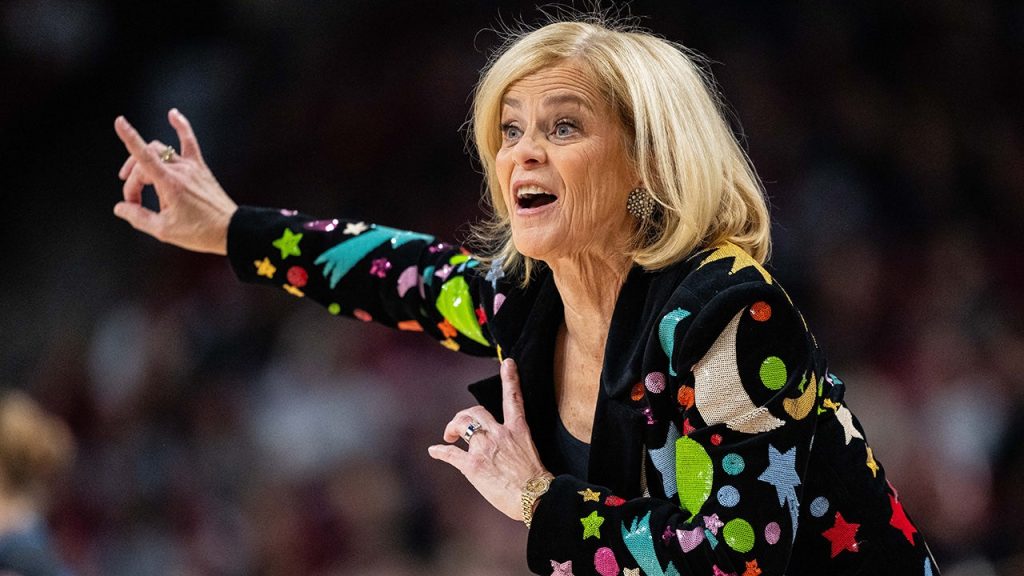The Thursday night clash between the LSU Tigers and Oklahoma Sooners, two Top-25 women’s college basketball powerhouses, was a fiery spectacle that transcended the typical on-court competition. The game, punctuated by player ejections, coach’s technical fouls, and a memorable clipboard-slapping incident involving LSU coach Kim Mulkey, showcased the intensity and passion inherent in high-stakes college basketball. The drama unfolded early in the first quarter when LSU forward Sa’Myah Smith and Oklahoma forward Liz Scott were ejected following a physical altercation in the paint.
The incident began with a struggle for positioning between Oklahoma center Beatrice Culliton and Smith. As Culliton raised her arm to create separation, Smith reacted by shoving her to the ground. Scott, witnessing the exchange, immediately retaliated by shoving Smith. The situation escalated rapidly, requiring LSU assistant coach Joe Schwartz to intervene and separate Smith from the escalating confrontation. Following a review of the play, Smith, known for her composed demeanor, was assessed a foul and subsequently ejected from the game. The ejection proved detrimental to LSU, as Smith’s presence was missed, particularly in the later stages of the game.
The officiating crew’s decision to eject Smith for pushing sparked a discussion about the interpretation of rules regarding physical contact. Mulkey, while acknowledging the rule against pushing, expressed surprise at the ejection, highlighting Smith’s typically calm demeanor and the impact of her absence on the team’s development plans. She referenced the wisdom of her mentor, former Louisiana Tech coach Leon Barmore, who emphasized the importance of maintaining composure in high-pressure situations. Despite the controversial ejection, Mulkey also acknowledged the entertainment value the incident provided for the fans in attendance, recognizing the drama it injected into the game.
Following the ejections, the game resumed with Oklahoma holding a slim 12-11 lead. The Sooners capitalized on Smith’s absence, utilizing their size advantage to remain competitive throughout the contest. Despite trailing by a substantial 24-point margin late in the third quarter, Oklahoma mounted a furious comeback, narrowing the gap to a single point in the final minute, demonstrating their resilience and determination.
The intensity on the sidelines mirrored the action on the court. In a particularly memorable moment during the third quarter, with LSU comfortably ahead 67-45, Mulkey, in a display of frustration, slapped a clipboard held by assistant coach Seimone Augustus. The incident, captured on camera, showed Mulkey yelling and gesturing animatedly while Augustus appeared momentarily stunned. Later in the game, Mulkey received a technical foul for arguing a call against star guard Flau’Jae Johnson. Oklahoma coach Jennie Baranczyk also received a technical foul at a different point in the game, further illustrating the heated atmosphere surrounding the contest.
The game concluded with a flurry of whistles, totaling five technical fouls and a staggering 63 free throw attempts, indicative of the physicality and contentious nature of the matchup. Mulkey, reflecting on the game’s events, recounted the ejections, the high-scoring affair, and her own technical foul. She expressed confusion about the official’s explanation for her technical, claiming she was merely looking at the big screen and not pointing, as the official had asserted. The incident highlighted the challenges of officiating a high-intensity game and the potential for misunderstandings between coaches and officials.
Despite the drama and controversy, LSU emerged victorious, defeating Oklahoma 107-100, improving their record to an impressive 22-1 and solidifying their position as the seventh-ranked team in the nation. The game served as a testament to the competitive fire of both teams, showcasing the passion and intensity that define women’s college basketball at the highest level. The game also highlighted the challenges of maintaining composure under pressure, both for players and coaches, and the impact of officiating decisions on the flow and outcome of a game.

